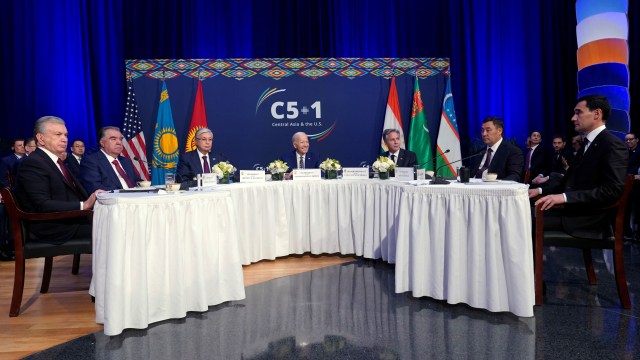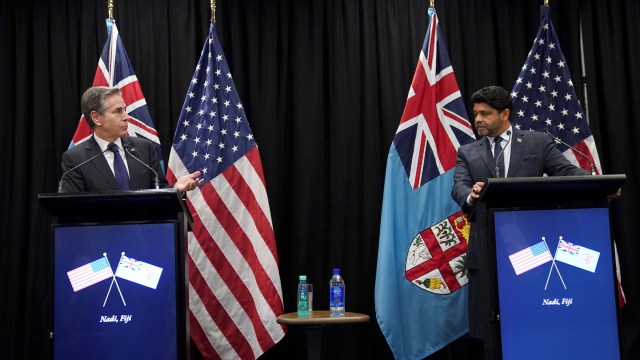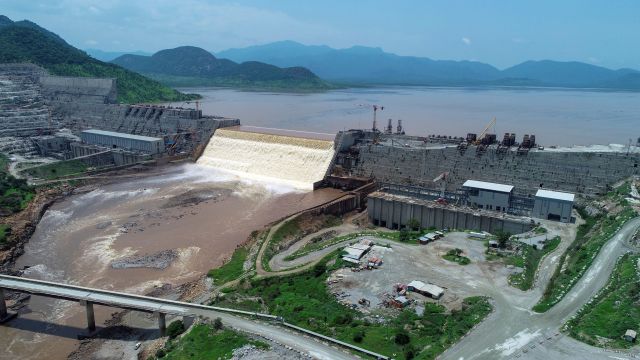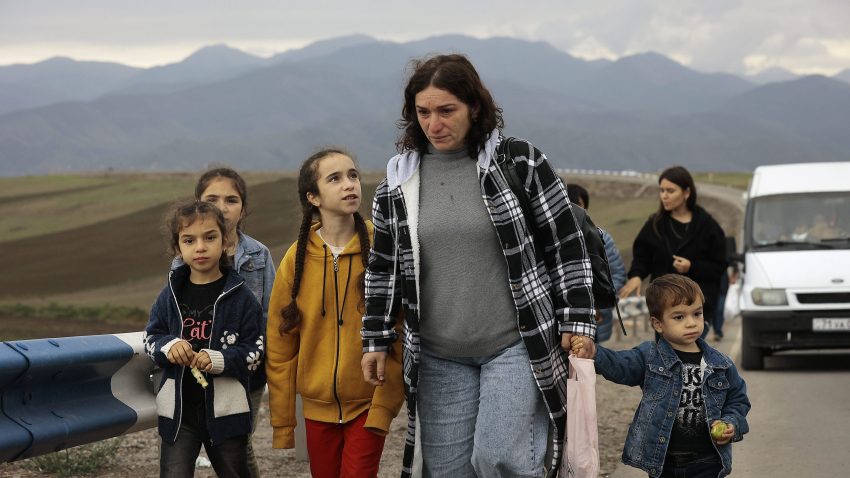Today at WPR, we’re covering Ukraine’s human rights record and U.S. engagement in Central Asia.
But first, here’s our take on today’s top story:
Armenia-Azerbaijan: An explosion at a fuel depot in Nagorno-Karabakh killed at least 20 Armenians and injured nearly 300 more, all of whom were waiting for gasoline to flee the region. Nagorno-Karabakh, which is internationally recognized as Azerbaijan’s territory, is in the process of being reincorporated into Azerbaijan after a military offensive last week. (Washington Post)
Meanwhile, Azerbaijani President Ilham Aliyev held talks with Turkish President Recep Tayyip Erdogan yesterday in Azerbaijan’s Nakhchivan exclave, where Aliyev hinted at the prospect of creating a land corridor connecting the exclave—and, in turn, Turkey—to Azerbaijan proper via Armenia, which opposes the move. (Reuters)
For more background: Read the Daily Review from Sept. 20.
Our Take: The mass exodus of ethnic Armenians from Nagorno-Karabakh is being described by most observers as ethnic cleansing, even though Armenians are not fleeing because Azerbaijan has forced them out of the region; Baku has in fact promised to ensure their safety and incorporate the area as an equal part of the country.
Get the Daily Review sent straight to your inbox every weekday.
Instead, they are fleeing due to fears of potential reprisals. But those fears are not unfounded given the history of the conflict in the region, which includes atrocities by both sides in the initial fighting 30 years ago. More recently, Azerbaijan was also accused of atrocities during the brief war in 2020, and over the past several months it essentially cut off the region’s access to food and medicines, resulting in a dire humanitarian crisis that is exacerbating the situation now. Many Armenians also understandably seek to avoid being subjected to a human rights landscape in Azerbaijan that limits freedom of expression and political dissent.
At the worst, then, the mass exodus is a crime against humanity. At the very least, it is a human tragedy, one that will put significant humanitarian pressure on Armenia. The international community will now have to step up and provide support for the Armenian refugees and ensure that Azerbaijan makes good on its promises for the Armenians who choose not to flee. But given outside powers’ failure to head off a military resolution to the crisis, Armenians might be forgiven for not expecting much.
As we wrote last week, though, this outcome has been inevitable for many years due to the shifting balance of power in recent years between the two sides, to say nothing of international law, which has always recognized the region as Azerbaijani territory. For obvious reasons, that is difficult to reconcile with the understandable international sympathy for the Armenians who are fleeing Nagorno-Karabakh today.
Looking ahead, the biggest danger, besides the humanitarian situation in Nagorno-Karabakh and Armenia, is that the risk of military escalation in the region has not subsided. Baku has long pressured Yerevan for a land corridor connecting its main territory to the Nakhchivan exclave, which borders Turkey. Any corridor, however, would come at the cost of Armenian territory, while also cutting Iran off from Armenia, a crucial land bridge north for Tehran; understandably, both adamantly oppose the move. Should Azerbaijan decide to pursue that corridor militarily, as Aliyev has hinted at in the past, it would almost certainly lead to a military escalation that could include Iran and, potentially, Turkey, Azerbaijan’s principal ally.


Ukraine Can Turn Human Rights Criticisms to Its Advantage
Kyiv’s reaction to a recent report showing that an errant Ukrainian missile was likely responsible for a deadly strike on a Ukrainian town in early September highlighted its defensiveness in response to human rights critiques of its war effort.
That defensiveness is unsurprising and even understandable. But, as Charli Carpenter writes, it is not actually necessarily. In fact, it may actually be hurting Ukraine more than it helps.
The U.S. Should Seize Its Strategic Opening in Central Asia
Last week, on the sidelines of the U.N. General Assembly, U.S. President Joe Biden met with his counterparts from the five states of Central Asia in the first-ever leaders’ summit of the so-called C5+1 format.

The meeting and its outcomes are a step in the right direction when it comes to U.S. policy attention toward an increasingly strategic region, but one that Washington has historically neglected. As Michael Rossi writes in today’s briefing, Washington has much to gain from fostering closer political and economic relations with the states of Central Asia.

Question of the Day: For the first four months of this year, which country surpassed China as the United States’ top trade partner?
Find the answer in the latest WPR Weekly Quiz, then read Frida Ghitis’ column on how the shift represents a tipping point for the global economy.

U.S. President Joe Biden hosted the leaders of 18 Pacific Island nations at the White House on Monday, the second gathering of its kind in a year as Washington attempts to expand its influence in the region.
Last year, the U.S. officially announced its “return” to the Pacific Islands, which have become a major arena for competition between Washington and Beijing, due to their strategic value to both countries.

The U.S.-China Competition Comes to the Pacific Islands
Feb. 16, 2022 | An intensifying geopolitical rivalry between the U.S. and China in the Pacific Islands may be a double-edged sword for island nations. Read more.
The latest talks between Egypt, Sudan and Ethiopia over the latter’s building of a mega dam on the Nile River broke up without an agreement over the weekend. Ethiopia’s chief negotiator said his country remains committed to continuing negotiations, while Egypt blamed Ethiopia for the failure to make a breakthrough.
As Jonathan Fenton-Harvey wrote last week, with both Egypt and Ethiopia set to join the BRICS grouping next year, BRICS has essentially absorbed this complex regional conflict into its midst, raising questions about the group’s potential to shape global affairs.
BRICS Now Owns Egypt and Ethiopia’s Nile Dam Dispute
Sept. 18, 2023 | In offering both Egypt and Ethiopia membership, BRICS has absorbed a complex regional conflict over a dam built on the Nile river. Read more.

More From WPR
- James Bosworth on AMLO’s foreign policy in Mexico.
- Mohammed Soliman on an ambitious new trade corridor project.
- Paul Poast on predicting the outcome of wars.
- Cristina Guevara on the drought in Panama.

